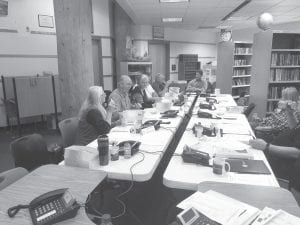Cook County commissioners were among the nearly 100 officials who gathered in Grand Portage for four days of cross-border emergency training. At the end of training, representatives from various agencies and organizations participated in a simulated disaster exercise. Here the commissioners, along with key county staff members, standby the phones as they would in a real-life catastrophic event.

On four beautiful fall days in October, nearly 100 emergency services providers and officials gathered in Grand Portage for intensive training on how to deal with a cross-border emergency. Participants from the United States and Canada participated in the Integrated Emergency Management Course (IEMC) held by the Federal Emergency Management Agency’s Emergency Management Training Institute.
Cook County Emergency Management Director Jim Wiinanen said, “This is a first-of-its kind coordinated effort for Minnesota and Ontario and we are extremely pleased with the level of commitment and interest from the various jurisdictions to work together to protect our people.”
Participants from five U.S. and Canadian jurisdictions including tribal, municipal, county, state, provincial and federal representatives from over 20 agencies in both countries came together to better coordinate response to an international catastrophe.
Instructors included experts from FEMA’s National Emergency Training Center Emergency Management Institute in Emmitsburg, Maryland. The four-day training ended with the simulation of a mock disaster of epic proportions on Wednesday, October 14. Trainees were asked to handle a hypothetical wildfire that was growing rapidly because of hot, dry conditions. Next came word that there was a public health issue with the local water supply— and if participants were not stressed enough— instructors threw in a horrific accident on Highway 61 with a tanker truck/ bus collision that blocked Highway 61.
The scenario seems implausible, but Michael Chesney, FEMA Region 5 director of national preparedness, said these crises are all things that FEMA has dealt with in his region, which covers Minnesota, Wisconsin, Illinois, Indiana, Ohio and Michigan. Participants were separated into three different rooms at the Grand Portage Community Center based on their roles and forced to communicate using phones and radio as they would in a real emergency.
Grand Portage Reservation Emergency Management Director Mike Keyport noted that in any disaster, “Communication is always an issue.”
Chesney also said that communication is one of the most important pieces of the training. He said he was impressed with the cooperation between the multiple jurisdictions involved in the exercise.
Chesney acknowledged that it was unlikely all of the disaster scenarios would occur at the same time, but FEMA’s goal in the training is to keep increasing the challenge.
“This is the place to practice, to make our mistakes and find out where the gaps are and then to be able to address those as time goes on,” Wiinanen said.
Minnesota Emergency Management Director Joe Kelly agreed. “We don’t want to learn these things when there’s a real event,” he said.
The life-saving disaster preparation is just a part of current international efforts. According to Thunder Bay News Watch, the Pigeon River Steering Committee has been working to get a mutual aid agreement in place for more than four years. Currently in its draft form, the Northern Emergency Management Assistance Compact needs national, provincial, state, tribal and municipal cooperation to make sure help is there when it is needed.
Kelly said progress has been made on an agreement, but there are issues of sovereignty and licensing to work out.
Thunder Bay Emergency Management Coordinator Dennis Brescasin said the international FEMA exercise was important. He said having a formal agreement could be life saving.
In the meantime, all of the agencies working together as they did in the FEMA exercise is crucial. Wiinanen said, “We’ve all agreed that if we’re needed on one side of the border or the other we’ll respond to the best of our ability and work out the details afterwards.”


Loading Comments